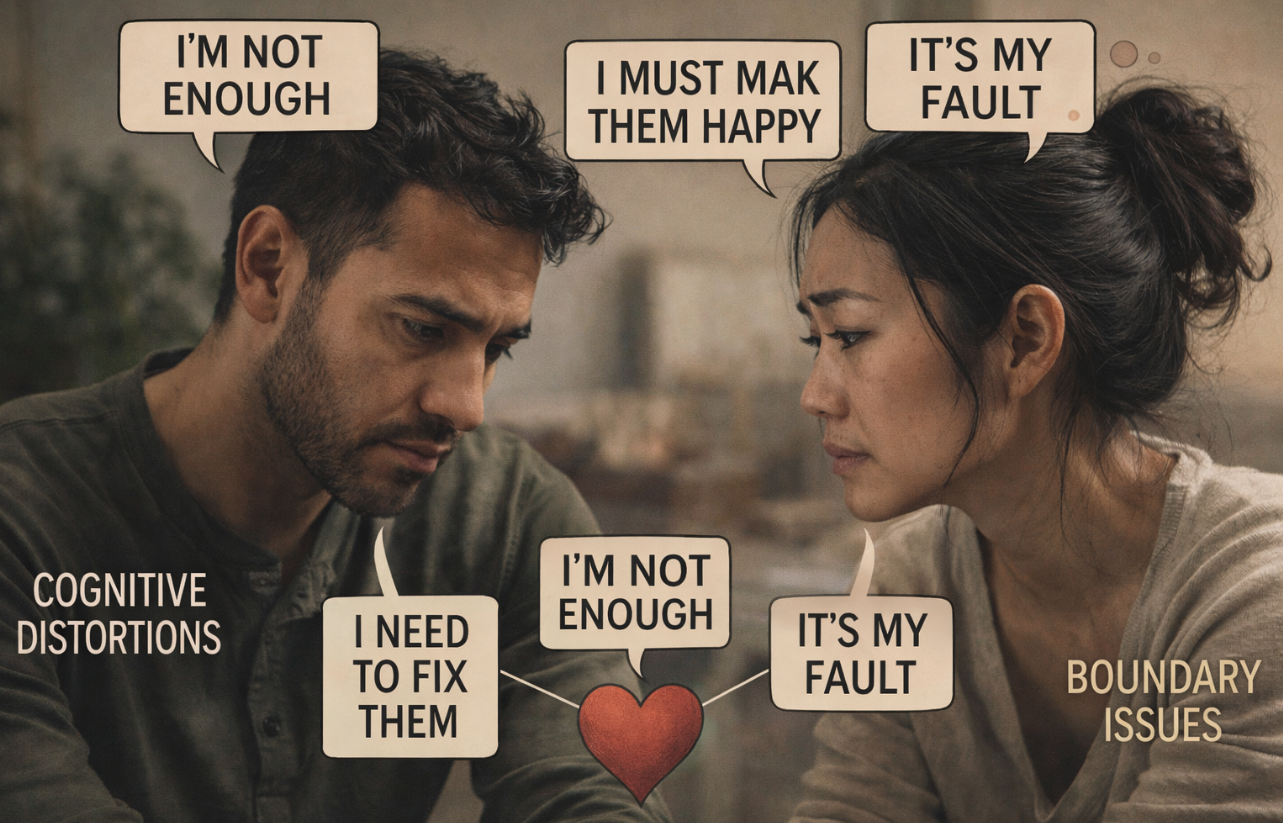Codependency

Take this mini assessment for codependency
Do you feel responsible for other people’s emotions, choices, or well-being?
Do you have difficulty identifying what you feel, want, or need?
Do you stay in relationships longer than feels emotionally safe or healthy?
Do you prioritize keeping the peace over expressing your true feelings?
Do you feel guilty when you say no or set limits?
Do you feel anxious or unsettled when someone is upset with you?
Do you find yourself over-functioning (doing more) when others under-function?
Do you feel your value comes from being helpful, needed, or reliable?
Do you struggle to ask for help, even when you need it?
Do you minimize or rationalize behavior that hurts you?
Do you feel uncomfortable receiving care, attention, or support?
Do you feel responsible for fixing or improving others?
Do you feel disconnected from your own needs until you are exhausted or resentful?
Do you adapt yourself to fit relationships, environments, or expectations?
Do you feel anxious when there is uncertainty or lack of control?
Do you have difficulty trusting your own perceptions or instincts in relationships?
Do you feel drawn to emotionally unavailable, chaotic, or needy partners?
Do you fear being seen as selfish, difficult, or “too much” if you speak up?
Do you feel more comfortable giving than receiving?
Do you feel emotionally drained but unsure how to change the pattern?
Reflecting on Your Responses
Mostly “Yes” or “Sometimes” may suggest codependent patterns worth exploring.
Overcoming Codependency:
Reclaiming Your Sense of Self Through DBT and Healthy Boundaries
Codependency often manifests as an excessive focus on the needs, desires, or approval of others, to the detriment of our own emotional well-being. Instead of operating from a place of balanced interdependence, codependent individuals tend to feel responsible for other people’s feelings, struggle to set healthy boundaries, and experience heightened guilt or shame when they do try to prioritize their own needs. This article will explore how to address cognitive distortions related to guilt and shame, practice boundary-setting, reconnect to yourself, and cultivate intimacy in healthier ways.
1. Understanding Codependency
Definition and Characteristics:
•Excessive caretaking: Feeling compelled to fix, solve, or mitigate another person’s problems, even at a cost to yourself.
•Loss of self-identity: Difficulty distinguishing where your own thoughts, needs, and desires end and another person’s begin.
•Fear of abandonment or rejection: An underlying sense of anxiety about not being enough, leading to people-pleasing or over-functioning in relationships.
•Difficulty with boundaries: Either too rigid (avoidance) or too permeable (enmeshment).
These tendencies often arise from early life experiences in which needs were dismissed, causing you to learn that you are “good” or “worthy” only when attending to someone else’s emotions.
2. Common Cognitive Distortions in Codependency
Cognitive distortions are inaccurate or biased thought patterns that feed into negative beliefs about ourselves or others. In codependency, some frequent distortions include:
1. All-or-Nothing Thinking (“Black-and-White Thinking”):
•Example: “If I don’t take care of them 24/7, I’m a selfish person.”
•Tip: Use Mindfulness to stay present with your nuanced reality. Situations rarely boil down to “all good” or “all bad.”
2. Overgeneralization:
•Example: “I disappointed them once; I’ll always disappoint people.”
•D Tip: Challenge overgeneralizations with Dialectical Thinking- recognize that a single instance does not define your entire identity or relationship dynamic.
3. Personalization:
•Example: “They seem sad today. It must be my fault.”
•Tip: Practice Mindfulness of Emotions to separate your feelings from others’ behaviors. Use reality checks to see if their mood truly relates to something you did.
4. Should Statements:
•Example: “I should always be there for my partner, no matter what.”
•Tip: Transform “should” statements into balanced self-talk: “I would prefer to support my partner, and I will also consider my own needs.”
By identifying and challenging these cognitive distortions, you begin to see yourself more compassionately and accurately.
3. Emotions of Guilt and Shame
In codependency, guilt and shame often play a central role, driving us to sacrifice our own well-being for others.
•Guilt: The sense of “I did something bad.”
•This can spur appropriate accountability but can also become excessive, leading to a feeling of constant obligation.
•Shame: The feeling of “I am bad.”
•This internalized belief can be especially harmful, as it undercuts self-worth and makes you feel inherently flawed.

People talk about boundaries all the time, but rarely explain what they actually are or why they matter.
At their core, boundaries are not walls or punishments. They are the limits that protect your emotional energy, time, and sense of self. Boundaries help define where you end and someone else begins. They clarify what you are responsible for, and what you are not.
Without boundaries, relationships often slide into resentment, burnout, or emotional exhaustion. With boundaries, relationships become clearer, safer, and more sustainable.
Boundaries aren’t about controlling others. They’re about honoring your needs and communicating them in a way that supports both self-respect and connection.
Why Boundaries Feel So Hard
For many people, especially those with trauma histories or codependent patterns, boundaries weren’t modeled as safe or acceptable growing up. You may have learned that love meant over-giving, staying quiet, or keeping the peace. Saying no may feel selfish, dangerous, or unkind.
That’s where communication tools come in. Boundaries don’t just exist internally—they need to be expressed. And not every situation calls for the same approach.
Choosing the Right Tool: DEAR MAN, GIVE, and FAST
Different boundary conversations have different goals. These DBT skills help you communicate with clarity without abandoning yourself.
DEAR MAN – When You Need to Ask or Set a Limit
Use DEAR MAN when your goal is to:
Ask for something
Say no
Set or reinforce a boundary
Advocate for your needs
DEAR MAN focuses on effectiveness – clearly stating what you need and why it matters.
You might use DEAR MAN with:
A partner who keeps crossing a line
A family member making unreasonable requests
A workplace situation where expectations need to change
This skill is about being direct, grounded, and self-respecting, even if the other person is uncomfortable.
GIVE – When the Relationship Matters
Use GIVE when your goal is to:
Maintain connection
Show care while still being honest
Keep communication gentle and validating
GIVE is especially helpful in emotionally sensitive conversations or when someone is already dysregulated.
You might use GIVE with:
A grieving partner
A friend who feels rejected
A family member who is emotionally fragile
This skill prioritizes relationship preservation, without sacrificing your truth.
FAST – When Self-Respect Is on the Line
Use FAST when your goal is to:
Protect your integrity
Avoid guilt-based decisions
Stop over-apologizing or people-pleasing
FAST is critical for those who habitually abandon themselves to avoid conflict.
You might use FAST when:
You’re tempted to say yes out of guilt
Someone is pressuring you to compromise your values
You feel yourself shrinking to keep the peace
This skill reinforces that your needs and values matter, even if someone else is unhappy.
Boundaries Are a Practice, Not a Personality Trait
Boundaries aren’t something you either “have” or “don’t have.” They’re a skill, one that gets easier with practice, support, and self-trust.
Learning when to use DEAR MAN, GIVE, or FAST allows you to communicate in a way that aligns with your values, your nervous system, and the situation in front of you.
Boundaries are not about pushing people away. They are about staying connected, without losing yourself.
“Self-care is about making active choices to create a life you don’t want to escape from.”- Kathryn Boardway
True self-care isn’t about indulgence or checking off a wellness list, it’s about ownership. It’s the ongoing practice of recognizing that you are the CEO of your own life. You decide where your time goes, who has access to your energy, and what values guide your decisions. Self-care is choosing alignment over autopilot, even when it feels uncomfortable or unfamiliar.
At its core, self-care is about agency. It shows up in the boundaries you set, the relationships you invest in, and the way you respond to stress instead of reacting from habit or survival. It’s the decision to protect your health – physical, emotional, and mental – even when others have expectations of you. Sometimes that looks like saying no. Other times it looks like asking for help, seeking therapy, taking medication, or slowing down long enough to build insight into patterns that no longer serve you.
Real self-care is not passive… it’s intentional! It’s choosing to show up for yourself consistently, not just when you’re burned out or overwhelmed. Over time, these choices create stability, clarity, and a sense of safety within yourself. Self-care isn’t about escaping your life; it’s about designing one that feels sustainable, meaningful, and truly your own.
